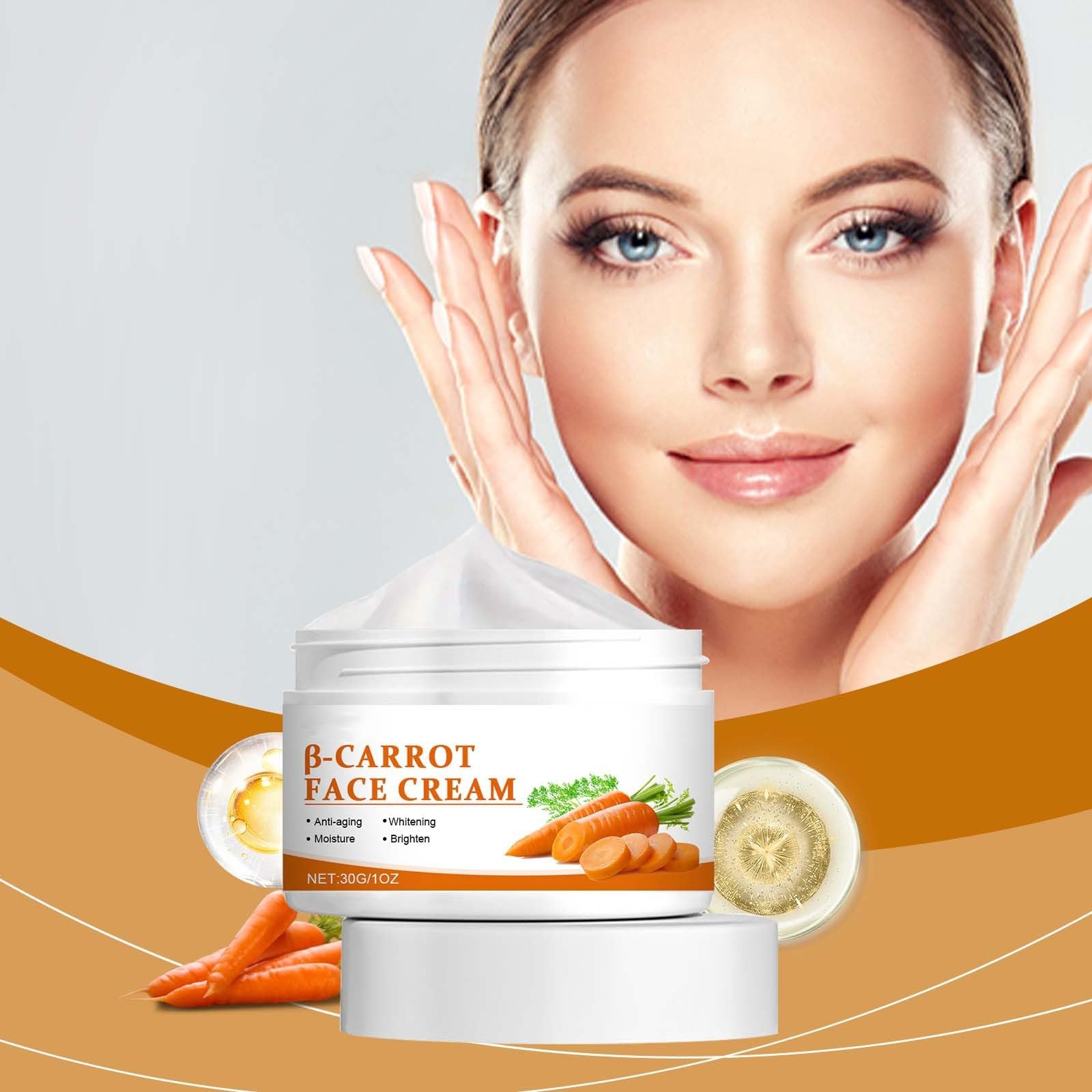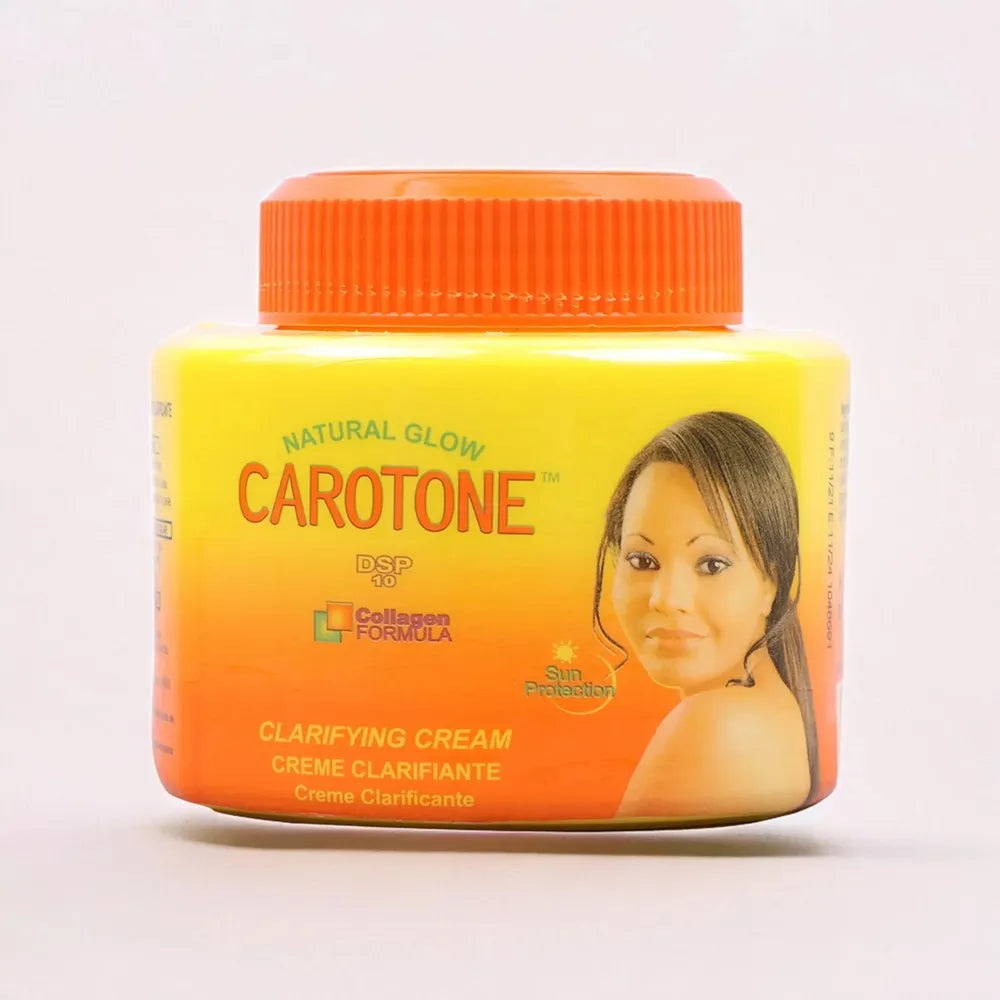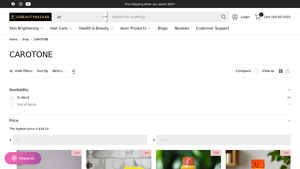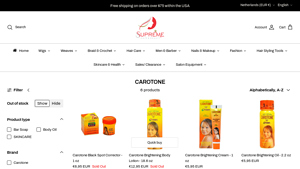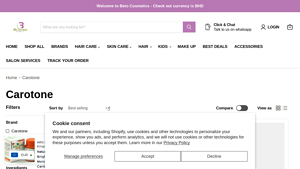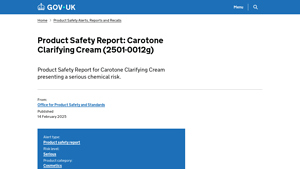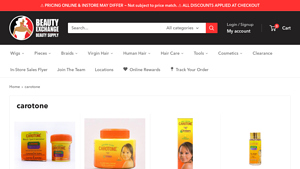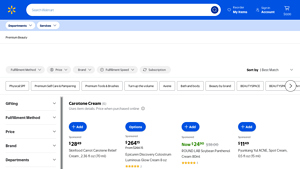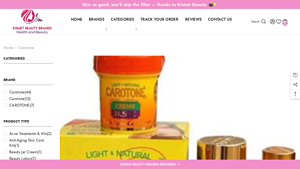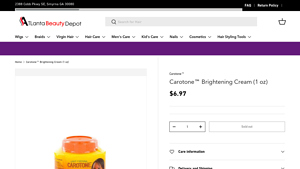Carotone Cream Guide: Type,Cost,Material…
Introduction: Navigating the Global Market for carotone cream
In the competitive landscape of the beauty and personal care industry, sourcing effective skin-lightening products like carotone cream poses unique challenges for international B2B buyers. With a growing demand across regions such as Africa, South America, the Middle East, and Europe, understanding the nuances of product formulations, ingredient safety, and market trends is essential for making informed purchasing decisions. This guide serves as a comprehensive resource, offering insights into various types of carotone creams, their applications, and the importance of supplier vetting.
Buyers will gain clarity on critical factors such as ingredient efficacy, cost analysis, and market positioning, empowering them to navigate supplier relationships with confidence. Additionally, the guide addresses potential regulatory concerns and health implications associated with skin-lightening products, ensuring that buyers prioritize safety alongside efficacy. Whether you are sourcing for retail, distribution, or wholesale purposes, this guide equips you with the knowledge needed to optimize your purchasing strategy and meet consumer demands effectively. By leveraging the information presented, B2B buyers can foster strong partnerships with reputable suppliers, ultimately enhancing their product offerings and driving business success in a diverse global market.
Understanding carotone cream Types and Variations
| Type Name | Key Distinguishing Features | Primary B2B Applications | Brief Pros & Cons for Buyers |
|---|---|---|---|
| Carotone Brightening Cream | Enriched with B-Carotene, designed for skin brightening | Retail, E-commerce, Beauty Salons | Pros: Effective for skin lightening; Cons: May have varying results across skin types. |
| Carotone Dark Spot Corrector | Targets dark spots and uneven skin tone, often with UV protection | Dermatology Clinics, Spas, Retail | Pros: Focused treatment for specific concerns; Cons: Requires consistent use for best results. |
| Carotone Body Lotion | Hydrating formula that also brightens skin, available in various sizes | Wholesale Distribution, Retail | Pros: Multi-functional (moisturizes and brightens); Cons: Slower visible results compared to creams. |
| Carotone Brightening Soap | Soap formulation that brightens skin while cleansing | Retail, E-commerce, Beauty Salons | Pros: Easy to use; integrates into daily routines; Cons: May not provide as intense results as creams. |
| Carotone Serum | Lightweight serum for targeted application, often for dark spots | Spas, Dermatology Clinics, Retail | Pros: Fast-absorbing and effective for spot treatment; Cons: Higher price point compared to creams. |
What are the Characteristics of Carotone Brightening Cream?
Carotone Brightening Cream is formulated with B-Carotene, known for its skin-lightening properties. This cream is ideal for individuals seeking to enhance their skin tone and achieve a more radiant complexion. For B2B buyers, it is essential to consider the target market’s skin type and preferences since results can vary widely. Retailers and beauty salons can benefit from offering this product as part of their skin care lines, catering to consumers interested in brightening solutions.
How Does Carotone Dark Spot Corrector Work?
The Carotone Dark Spot Corrector is designed specifically for addressing hyperpigmentation and dark spots. It often includes UV protection to prevent further skin damage. This product is suitable for dermatology clinics and spas that provide specialized treatments. When purchasing, B2B buyers should evaluate the product’s effectiveness and customer reviews to ensure it meets the needs of their clientele, as consistent application is crucial for visible results.
Why Choose Carotone Body Lotion?
Carotone Body Lotion combines moisturizing properties with skin-brightening effects, making it a versatile product for daily use. It is available in various sizes, appealing to both individual consumers and bulk buyers. B2B buyers should consider stocking this lotion as part of a broader skincare range, as it caters to customers looking for hydration alongside skin enhancement. However, it is important to manage expectations regarding the speed of visible results.
What Benefits Does Carotone Brightening Soap Provide?
Carotone Brightening Soap serves as a dual-purpose product that cleanses while promoting brighter skin. Its ease of use makes it a popular choice for consumers looking to incorporate skin brightening into their daily routines. Retailers can leverage this product to attract customers seeking simple yet effective skincare solutions. However, B2B buyers should be aware that while soap can be convenient, it may not deliver the same intensity of results as creams or serums.
How Effective is Carotone Serum for Targeted Treatment?
The Carotone Serum is a lightweight formulation that allows for targeted application, particularly on dark spots and uneven areas. Its fast-absorbing nature makes it appealing for consumers who prefer quick results. B2B buyers in the beauty industry should consider including this serum in their product offerings, especially in spas and clinics where personalized skincare is emphasized. However, the higher price point compared to creams may require careful marketing to justify the investment for consumers.
Key Industrial Applications of carotone cream
| Industry/Sector | Specific Application of Carotone Cream | Value/Benefit for the Business | Key Sourcing Considerations for this Application |
|---|---|---|---|
| Cosmetics & Skincare | Skin Lightening and Brightening Products | Enhances product range, attracting diverse clientele | Quality assurance, ingredient sourcing, regulatory compliance |
| Health & Beauty Retail | Retail of Carotone Cream and Related Products | Increased sales through popular product lines | Market trends, shelf life, packaging requirements |
| Spa & Wellness | Spa Treatments Incorporating Carotone Cream | Differentiates service offerings, enhances customer experience | Supplier reliability, product efficacy, training for staff |
| Pharmaceutical | Dermatological Solutions for Skin Conditions | Addresses specific health needs, expands service scope | Clinical testing, safety certifications, ingredient transparency |
| E-commerce | Online Sales Platforms for Carotone Products | Access to broader markets, convenience for consumers | Digital marketing strategies, shipping logistics, competitive pricing |
How is Carotone Cream Used in the Cosmetics & Skincare Industry?
Carotone cream is primarily used in the cosmetics and skincare industry for its skin-lightening and brightening properties. It appeals to consumers seeking to enhance their complexion and reduce dark spots. Businesses can benefit from incorporating Carotone products into their offerings, as they cater to a growing demand for effective skincare solutions. International buyers must consider sourcing from reputable manufacturers that comply with local regulations and quality standards to ensure consumer safety and satisfaction.
What Role Does Carotone Cream Play in Health & Beauty Retail?
In health and beauty retail, Carotone cream is marketed as a popular skin treatment option, appealing to a broad audience. Retailers can leverage the cream’s established reputation to boost sales and attract new customers. Buyers in this sector should focus on understanding market trends and consumer preferences while ensuring that the products have adequate shelf life and comply with local labeling regulations to avoid potential legal issues.
How Can Spas Benefit from Incorporating Carotone Cream in Treatments?
Spas and wellness centers can utilize Carotone cream in various treatments, offering clients skin-brightening services that enhance their overall experience. This differentiation can attract clients looking for specialized skincare options. For international B2B buyers, it is essential to ensure that staff are trained in the application of these products and that suppliers are reliable to maintain service quality and customer satisfaction.
What are the Applications of Carotone Cream in Pharmaceuticals?
In the pharmaceutical sector, Carotone cream is often used for dermatological solutions targeting skin conditions such as hyperpigmentation and acne scars. Its formulation can provide therapeutic benefits, addressing specific health needs. B2B buyers in this field should prioritize sourcing products with clinical testing, safety certifications, and transparent ingredient lists to ensure efficacy and compliance with health regulations.
How Does E-commerce Leverage Carotone Cream for Online Sales?
E-commerce platforms have found success in selling Carotone products, capitalizing on the growing trend of online shopping. By offering a convenient purchasing option, businesses can reach wider markets and cater to consumer demand for skincare products. Buyers in this sector must focus on digital marketing strategies, effective shipping logistics, and competitive pricing to establish a strong online presence and attract customers.
3 Common User Pain Points for ‘carotone cream’ & Their Solutions
Scenario 1: Sourcing Quality Carotone Cream Amid Market Saturation
The Problem: B2B buyers often struggle with finding high-quality Carotone cream amidst a saturated market filled with subpar or counterfeit products. This issue is especially pronounced in regions where skin-lightening products are in high demand, leading to a proliferation of brands claiming to offer authentic formulations. Buyers may find it challenging to differentiate between genuine products that deliver results and those that contain harmful ingredients or ineffective formulations. This not only risks harming their brand reputation but could also lead to legal repercussions if consumers experience adverse effects.
The Solution: To effectively source quality Carotone cream, B2B buyers should prioritize partnerships with reputable manufacturers and suppliers known for their transparency and adherence to regulatory standards. Conduct thorough background checks, including reviewing certifications, ingredient sourcing, and manufacturing processes. Additionally, establishing a solid relationship with suppliers can facilitate better communication about product specifications and quality assurance practices. Implementing a small-scale trial order can also provide insight into the product’s performance and consumer response before committing to larger quantities.
Scenario 2: Addressing Consumer Concerns About Safety and Efficacy
The Problem: A significant challenge for B2B buyers in the beauty industry is addressing consumer concerns regarding the safety and efficacy of Carotone cream. With growing awareness of the potential dangers associated with skin-lightening products—such as harmful ingredients like hydroquinone and mercury—buyers face pressure to provide products that not only meet consumer expectations for performance but also prioritize health and safety. This can result in consumer mistrust, reduced sales, and negative brand perception if not handled properly.
The Solution: To mitigate these concerns, B2B buyers should seek Carotone cream formulations that are free from toxic ingredients and are backed by clinical research demonstrating their safety and effectiveness. Collaborating with manufacturers who can provide detailed ingredient transparency and safety testing reports can enhance buyer confidence. Additionally, creating educational content for end-users about safe usage practices and the benefits of the product can further reassure consumers. Engaging with dermatologists or beauty influencers for endorsements can also add credibility and foster trust in the product’s safety.
Scenario 3: Navigating Regulatory Compliance for International Markets
The Problem: B2B buyers aiming to distribute Carotone cream in international markets often encounter complex regulatory compliance challenges. Different countries have varying regulations regarding the sale of skin-lightening products, including restrictions on certain ingredients. This can lead to confusion and potential legal issues if products are not compliant with local laws, which can result in fines, recalls, or a ban on sales in those regions.
The Solution: To navigate these regulatory landscapes successfully, B2B buyers should conduct comprehensive research on the specific requirements for each target market. This includes understanding ingredient regulations, labeling requirements, and any necessary certifications. Partnering with local legal experts or regulatory consultants can provide invaluable insights and ensure that all products meet local compliance standards. Additionally, staying informed about global trends and changes in regulations through industry associations can help buyers proactively adapt their strategies and maintain compliance, ultimately facilitating smoother market entry and sustained operations.
Strategic Material Selection Guide for carotone cream
What Are the Common Materials Used in Carotone Cream Formulation?
When selecting materials for carotone cream, it is essential to consider components that not only enhance product efficacy but also align with regulatory standards and consumer preferences in diverse international markets. Below, we analyze several common materials used in carotone cream formulations, focusing on their properties, advantages, disadvantages, and implications for international B2B buyers.
How Does B-Carotene Influence Carotone Cream Performance?
Key Properties: B-Carotene is a natural pigment and antioxidant that contributes to skin-lightening effects. It is stable under normal storage conditions but can degrade under excessive heat and light.
Pros & Cons: B-Carotene is a cost-effective ingredient that is widely accepted in cosmetic formulations. However, its effectiveness can vary based on concentration and formulation stability, requiring careful handling during manufacturing.
Impact on Application: B-Carotene is compatible with various emulsifiers and surfactants, making it suitable for creams and lotions. However, its solubility in oil rather than water can limit its use in certain formulations.
Considerations for International Buyers: Compliance with cosmetic regulations, such as the European Union’s Cosmetics Regulation (EC) No. 1223/2009, is crucial. Buyers should ensure that the B-Carotene used meets safety standards and is sourced from reputable suppliers.
What Role Does Glycerin Play in Carotone Cream Formulations?
Key Properties: Glycerin is a humectant that attracts moisture and enhances skin hydration. It is non-toxic and has a high boiling point, making it stable in various formulations.
Pros & Cons: Glycerin is inexpensive and readily available, contributing to the cream’s moisturizing properties. However, excessive use can result in a sticky texture, which may deter some consumers.
Impact on Application: Glycerin enhances the cream’s texture and provides a smooth application. It is compatible with most cosmetic ingredients, making it versatile for different formulations.
Considerations for International Buyers: Glycerin must comply with local regulations, such as those set by the FDA in the United States or the INCI (International Nomenclature of Cosmetic Ingredients) standards in Europe. Buyers should verify the source to ensure it is of vegetable origin, as this is often preferred in many markets.
Why Is Shea Butter a Popular Ingredient in Carotone Cream?
Key Properties: Shea butter is a natural fat extracted from the nuts of the shea tree. It has excellent emollient properties and is stable at room temperature.
Pros & Cons: Shea butter provides deep moisturization and skin barrier protection, making it ideal for dry skin formulations. However, it can be more expensive than synthetic alternatives and may require specific processing to maintain quality.
Impact on Application: It enhances the cream’s emollience and provides a rich texture. Shea butter is compatible with a variety of oils and emulsifiers, making it suitable for various cream formulations.
Considerations for International Buyers: Buyers should consider fair trade practices and sustainability when sourcing shea butter, especially in regions like Africa where it is predominantly produced. Compliance with organic certification can also be a selling point in markets like Europe.
What Are the Benefits of Using Natural Oils in Carotone Cream?
Key Properties: Natural oils such as jojoba or almond oil are rich in fatty acids and vitamins, providing nourishment and hydration to the skin. They are generally stable but can oxidize if not stored properly.
Pros & Cons: Natural oils enhance the sensory profile of the cream and are often favored by consumers seeking organic or natural products. However, they can be more expensive and may require careful formulation to prevent rancidity.
Impact on Application: These oils improve the cream’s spreadability and absorption. They are compatible with other ingredients, allowing for a wide range of formulations.
Considerations for International Buyers: Buyers must ensure that the oils comply with international standards, such as those set by the COSMOS standard in Europe. Sourcing from certified organic suppliers can enhance marketability.
Summary Table of Materials for Carotone Cream
| Material | Typical Use Case for carotone cream | Key Advantage | Key Disadvantage/Limitation | Relative Cost (Low/Med/High) |
|---|---|---|---|---|
| B-Carotene | Skin-lightening agent | Natural antioxidant | Stability issues in formulations | Medium |
| Glycerin | Humectant for hydration | Cost-effective and versatile | Can be sticky in high concentrations | Low |
| Shea Butter | Emollient for moisturizing | Deep moisturization | Higher cost and processing needs | High |
| Natural Oils | Nourishing component | Enhances sensory profile | Potential for oxidation | Medium |
This guide aims to provide B2B buyers with actionable insights into material selection for carotone cream, ensuring compliance with international standards while meeting consumer demands for quality and efficacy.
In-depth Look: Manufacturing Processes and Quality Assurance for carotone cream
What Are the Key Stages in the Manufacturing Process of Carotone Cream?
The manufacturing process of Carotone cream involves several critical stages designed to ensure the final product meets quality standards and consumer expectations.
1. Material Preparation
This initial stage involves sourcing and preparing raw materials, which are essential for the formulation of the cream. Key ingredients typically include B-carotene, glycerin, shea butter, and other active compounds known for their skin-brightening properties. Suppliers must adhere to strict quality standards, ensuring that all raw materials are free from contaminants and meet regulatory requirements. This stage may also involve testing the raw materials for potency and purity, which is crucial for maintaining the effectiveness of the final product.
2. Formulation and Mixing
Once the raw materials are prepared, they are mixed according to a precise formulation. This stage requires skilled technicians who understand the chemical properties of the ingredients and their interactions. The mixing process often employs advanced equipment to ensure uniformity and consistency in the product. Techniques such as homogenization may be used to achieve a smooth texture, which is vital for consumer acceptance.
3. Filling and Packaging
After formulation, the cream is filled into containers, which can vary in size from small tubes to larger jars. Automated filling machines are commonly used to enhance efficiency and minimize contamination risks. Packaging materials must be selected carefully to protect the product from light and air, which can degrade sensitive ingredients like B-carotene. Labels should provide clear information on usage, ingredients, and any warnings, ensuring compliance with international labeling regulations.
4. Finishing Touches
The final stage includes quality checks and the addition of any final touches, such as tamper-proof seals or outer packaging. This is also when products are prepared for distribution, either through bulk shipments or direct-to-retail channels. At this point, the cream is subjected to final quality assurance checks to ensure it meets all specifications before it reaches the market.
How Is Quality Assurance Implemented During the Manufacturing of Carotone Cream?
Quality assurance (QA) is an integral part of the manufacturing process, ensuring that Carotone cream meets both regulatory and consumer standards.
Relevant International Standards for Quality Assurance
Manufacturers of Carotone cream often comply with international quality standards such as ISO 9001, which outlines a framework for quality management systems. This certification demonstrates a commitment to consistent quality and continuous improvement. Additionally, industry-specific certifications may be required, such as CE marking in Europe, which ensures that products meet health, safety, and environmental protection standards.
Key Quality Control Checkpoints
Quality control (QC) is implemented at various checkpoints throughout the manufacturing process:
-
Incoming Quality Control (IQC): This phase involves inspecting raw materials before they enter the production line. Testing may include checking for contaminants, potency, and adherence to specifications.
-
In-Process Quality Control (IPQC): During the formulation and mixing stages, samples are taken at regular intervals to ensure that the product remains within established parameters. This may involve checking pH levels, viscosity, and other critical attributes.
-
Final Quality Control (FQC): Before packaging, the final product undergoes comprehensive testing to verify that it meets all quality standards. This may include stability testing, microbiological testing, and evaluation of sensory attributes such as texture and fragrance.
What Testing Methods Are Commonly Used in the Quality Assurance of Carotone Cream?
To ensure the safety and efficacy of Carotone cream, various testing methods are utilized throughout the manufacturing process.
Common Testing Methods
-
Microbiological Testing: This testing is critical for ensuring that the cream is free from harmful bacteria, molds, and yeasts. It is especially important for products intended for sensitive skin.
-
Stability Testing: Products are subjected to various conditions (temperature, humidity, light exposure) to determine their shelf life and efficacy over time. This testing helps ensure that the product maintains its integrity until the expiration date.
-
Chemical Testing: Active ingredients are analyzed for concentration and purity, ensuring that the cream delivers the promised benefits without harmful substances.
How Can B2B Buyers Verify Supplier Quality Control?
For international B2B buyers, particularly those from regions like Africa, South America, the Middle East, and Europe, verifying a supplier’s quality control processes is essential.
Supplier Audits and Reports
Conducting regular audits is one of the most effective ways for buyers to assess a supplier’s quality assurance practices. These audits should evaluate compliance with international standards, manufacturing practices, and testing methods. Buyers can request detailed reports that outline the supplier’s quality control processes, including results from IQC, IPQC, and FQC phases.
Third-Party Inspections
Engaging third-party inspection services can provide an objective assessment of a supplier’s quality control measures. These organizations specialize in evaluating manufacturing practices and can offer insights into areas for improvement.
What Are the QC and Certification Nuances for International B2B Buyers?
When sourcing Carotone cream, international buyers must be aware of certain nuances related to quality control and certification.
Regional Compliance Requirements
Different regions have specific regulations regarding cosmetic products, including permitted ingredients and labeling practices. Buyers should familiarize themselves with these regulations to avoid compliance issues. For instance, some countries may have restrictions on the use of certain skin-lightening agents, requiring suppliers to adjust their formulations accordingly.
Cultural Sensitivities and Safety Concerns
Given the diverse markets for Carotone cream, it’s crucial for suppliers to understand and address cultural sensitivities surrounding skin-lightening products. Buyers should prioritize suppliers who actively engage in safe practices, transparency in ingredient sourcing, and responsible marketing.
By understanding these manufacturing processes and quality assurance practices, B2B buyers can make informed decisions when sourcing Carotone cream, ensuring they partner with reliable suppliers committed to quality and safety.
Practical Sourcing Guide: A Step-by-Step Checklist for ‘carotone cream’
To successfully procure Carotone cream, it is essential to follow a structured approach that ensures quality, compliance, and supplier reliability. This guide provides a step-by-step checklist to assist B2B buyers in navigating the sourcing process effectively.
Step 1: Identify Your Market Needs
Understanding your specific market needs is the first step in sourcing Carotone cream. Consider the target demographic, regional preferences, and regulatory requirements specific to your market. Different regions may have varying demands for skin products, such as preferences for natural ingredients or specific formulations that align with local beauty standards.
Step 2: Define Product Specifications
Clearly outline the technical specifications for the Carotone cream you wish to source. This includes the desired formulation, packaging options, and any specific certifications or ingredients required. Being precise about these details helps streamline the sourcing process and ensures that suppliers can meet your expectations.
- Considerations:
- Ingredients: Ensure compliance with health regulations in your target market.
- Packaging: Decide on sizes and types (e.g., jars, tubes) that appeal to your consumers.
Step 3: Research Potential Suppliers
Conduct thorough research to identify reputable suppliers who specialize in Carotone products. Utilize online directories, trade shows, and industry networks to compile a list of potential candidates. Pay attention to suppliers with a proven track record in your target regions.
- Key Actions:
- Check online reviews and ratings from other B2B buyers.
- Look for suppliers with experience in international shipping and compliance.
Step 4: Evaluate Supplier Certifications
Verify that potential suppliers hold the necessary certifications that ensure product quality and safety. This could include ISO certifications, Good Manufacturing Practices (GMP), and compliance with local and international health regulations. Certifications are essential as they reflect the supplier’s commitment to quality and safety.
- Important Points:
- Request copies of certifications and relevant documentation.
- Inquire about the supplier’s quality assurance processes.
Step 5: Request Samples for Quality Assessment
Before making a bulk purchase, always request samples of the Carotone cream for evaluation. This allows you to assess the product’s quality, consistency, and packaging. Sampling is crucial to avoid costly mistakes and ensure that the product meets your standards.
- Evaluation Criteria:
- Texture and scent: Does it align with consumer preferences?
- Efficacy: Does it deliver the promised benefits?
Step 6: Negotiate Terms and Pricing
Once you have selected a suitable supplier, engage in negotiations regarding pricing, payment terms, and delivery schedules. It’s vital to establish clear terms to avoid misunderstandings later in the process. Competitive pricing can enhance your profit margins, but ensure that quality is not compromised.
- Negotiation Tips:
- Discuss bulk discounts or long-term partnership incentives.
- Clarify shipping costs and timelines.
Step 7: Finalize Contracts and Place Orders
After agreeing on terms, formalize the arrangement by drafting a comprehensive contract. This should outline all agreed-upon terms, including product specifications, delivery schedules, and payment terms. A well-defined contract protects both parties and ensures accountability.
- Contract Essentials:
- Include clauses on quality control and dispute resolution.
- Ensure that both parties understand their obligations.
By following these steps, B2B buyers can streamline their sourcing process for Carotone cream, ensuring that they select high-quality products that meet market demands and regulatory requirements.
Comprehensive Cost and Pricing Analysis for carotone cream Sourcing
What Are the Key Cost Components in Sourcing Carotone Cream?
When sourcing Carotone cream, understanding the cost structure is essential for effective budgeting and pricing strategies. The primary components include:
-
Materials: The raw ingredients, such as B-Carotene and other active compounds, significantly influence the overall cost. Suppliers often source these materials in bulk, affecting unit pricing based on market fluctuations.
-
Labor: Labor costs encompass both direct and indirect wages associated with production. This includes skilled labor for formulation and unskilled labor for packaging and handling.
-
Manufacturing Overhead: This includes utilities, rent, and equipment maintenance costs. Efficient production processes can help minimize these overheads.
-
Tooling: Initial setup costs for manufacturing equipment and molds can be substantial but are typically amortized over large production runs.
-
Quality Control (QC): Ensuring product consistency and safety requires investment in testing and compliance. This is particularly crucial for skin-lightening products due to regulatory scrutiny.
-
Logistics: Shipping and handling costs, including freight and warehousing, must be considered, especially for international shipments. These costs vary based on the destination and shipping method.
-
Margin: Suppliers typically apply a markup to cover their costs and generate profit. Understanding the supplier’s margin is critical for negotiation.
How Do Price Influencers Affect Carotone Cream Sourcing?
Several factors can influence the pricing of Carotone cream in the B2B market:
-
Volume/MOQ: Minimum order quantities (MOQ) can significantly impact pricing. Larger orders often qualify for bulk discounts, enhancing cost-efficiency.
-
Specifications and Customization: Custom formulations or packaging can increase costs. Buyers should clearly define their requirements to avoid unexpected charges.
-
Materials: The quality and source of materials can vary widely, affecting overall product pricing. High-quality ingredients typically command higher prices.
-
Quality Certifications: Compliance with local and international regulations, such as GMP (Good Manufacturing Practices), can add to costs. However, these certifications may enhance product appeal in discerning markets.
-
Supplier Factors: The supplier’s reputation, production capabilities, and location can influence pricing. Established suppliers may charge a premium for reliability.
-
Incoterms: Understanding shipping terms (e.g., FOB, CIF) is vital as they dictate who bears the shipping costs and risks, affecting the total landed cost.
What Are Some Effective Buyer Tips for Negotiating Carotone Cream Prices?
When negotiating prices for Carotone cream, international buyers should consider the following strategies to optimize their sourcing:
-
Leverage Volume Discounts: Consolidate orders to meet or exceed MOQs for better pricing. This approach not only reduces per-unit costs but also builds stronger relationships with suppliers.
-
Evaluate Total Cost of Ownership (TCO): Beyond the sticker price, consider logistics, duties, and potential returns. A lower initial price may not always equate to better value.
-
Negotiate Payment Terms: Flexible payment options can improve cash flow. Discuss terms such as advance payments or installment plans to reduce upfront costs.
-
Research Market Prices: Stay informed about market trends and competitor pricing. This knowledge can provide leverage in negotiations.
-
Seek Multiple Quotes: Obtaining quotes from various suppliers allows for comparison and may reveal hidden costs. This practice can also strengthen your negotiating position.
-
Understand Regional Pricing Nuances: Different regions may have varying expectations regarding product quality and pricing. Tailoring your approach based on regional norms can yield better results.
Disclaimer on Indicative Prices
It is essential to note that the prices for Carotone cream can fluctuate based on several factors, including market demand, raw material costs, and shipping rates. Therefore, the prices mentioned in this analysis are indicative and should be verified with suppliers for accuracy and current market conditions.
Alternatives Analysis: Comparing carotone cream With Other Solutions
Understanding Alternatives in Skin Lightening Solutions
In the beauty and skincare market, particularly within the realm of skin lightening, various products and methods are available to consumers. B2B buyers looking to expand their product lines or enhance their offerings should consider alternatives to Carotone Cream. This section provides a comparative analysis of Carotone Cream alongside other popular skin lightening solutions, helping buyers make informed decisions.
Comparison of Skin Lightening Solutions
| Comparison Aspect | Carotone Cream | Hydroquinone Cream | Natural Skin Lightening Methods |
|---|---|---|---|
| Performance | Effective for brightening and evening skin tone | Highly effective but may have side effects | Gradual results; depends on the natural ingredients used |
| Cost | Moderate ($6.50 – $19.99) | Higher ($20 – $50) | Variable; often lower cost for DIY solutions |
| Ease of Implementation | Easy to apply; no special skills required | Requires guidance from professionals | Simple for DIY; may require research for best practices |
| Maintenance | Regular application needed | Can cause irritation; may need monitoring | Minimal upkeep once routine is established |
| Best Use Case | Quick results for skin brightening | Severe discoloration or hyperpigmentation | Long-term, holistic approach to skin care |
Detailed Breakdown of Alternatives
Hydroquinone Cream
Hydroquinone is one of the most potent skin-lightening agents available. It is clinically proven to reduce hyperpigmentation, dark spots, and melasma. However, it often requires a prescription due to potential side effects such as skin irritation, redness, and, in rare cases, a condition known as ochronosis (a bluish-black discoloration of the skin). For B2B buyers, hydroquinone may appeal to those targeting customers with severe skin discoloration issues, but it necessitates thorough education on safe usage and potential risks.
Natural Skin Lightening Methods
Natural skin lightening methods include various DIY solutions utilizing ingredients like lemon juice, turmeric, or yogurt. These alternatives are generally safer and can be cost-effective, appealing to a growing segment of consumers seeking organic and natural products. However, the results can be inconsistent and slow compared to chemical options like Carotone Cream or hydroquinone. For B2B buyers, offering natural alternatives can cater to a market increasingly focused on clean beauty and sustainability, though it may require more consumer education regarding efficacy and application techniques.
Conclusion: Making the Right Choice for Your Business
When deciding between Carotone Cream and its alternatives, B2B buyers should consider their target audience’s needs and preferences. Carotone Cream offers a balance of effectiveness and ease of use, while hydroquinone is a strong option for those needing immediate results but comes with potential risks. Natural methods appeal to health-conscious consumers but may require more time to show results. Ultimately, the choice will depend on the specific market segment and the message that aligns with your brand’s values and customer expectations.
Essential Technical Properties and Trade Terminology for carotone cream
What Are the Key Technical Properties of Carotone Cream That B2B Buyers Should Consider?
When evaluating carotone cream for business procurement, understanding its technical properties is essential. Here are several critical specifications:
-
Active Ingredients: The primary active ingredient in carotone cream is Beta-Carotene, known for its skin-lightening and antioxidant properties. It is crucial for B2B buyers to verify the concentration of Beta-Carotene, as this affects the cream’s efficacy. Products with higher concentrations may yield better results, appealing to consumers seeking effective skin solutions.
-
pH Level: The pH level of skincare products typically ranges from 4.5 to 6.5, which is ideal for maintaining skin health. A product that strays outside this range may cause irritation or compromise skin integrity. B2B buyers should ensure that carotone cream is formulated within this pH range to maximize consumer safety and satisfaction.
-
Texture and Consistency: Carotone cream should have a smooth and creamy texture that facilitates easy application and absorption. A product that is too thick may deter consumers, while a runny consistency may lead to wastage. Evaluating the texture can help buyers predict consumer acceptance and reduce returns.
-
Packaging Type: The packaging of carotone cream, whether in jars, tubes, or pumps, plays a significant role in product preservation and user experience. Airtight containers help prevent contamination and extend shelf life. B2B buyers must consider packaging that aligns with their brand image and meets consumer preferences.
-
Shelf Life: Understanding the shelf life of carotone cream is vital for inventory management. A longer shelf life reduces the risk of product spoilage and enhances profitability. Buyers should request stability testing data to confirm the cream’s longevity.
-
Compliance with Regulations: Depending on the target market, carotone cream must comply with local regulations regarding cosmetic products, including ingredient safety and labeling requirements. Buyers need to verify that suppliers provide appropriate documentation to avoid legal issues.
What Are the Common Trade Terms Used in the Carotone Cream Market?
Familiarity with industry jargon can significantly enhance communication and negotiation for B2B buyers. Here are several common terms relevant to the carotone cream trade:
-
OEM (Original Equipment Manufacturer): This term refers to companies that produce goods that are rebranded by another company for sale. Understanding OEM relationships can help buyers identify potential suppliers that offer customizable product options.
-
MOQ (Minimum Order Quantity): MOQ is the smallest quantity a supplier is willing to sell. Knowing the MOQ helps buyers gauge their purchasing capabilities and negotiate better terms, especially when entering new markets.
-
RFQ (Request for Quotation): An RFQ is a document sent to suppliers to request pricing information for specific products or services. It is essential for B2B buyers to use RFQs to compare costs and terms from different suppliers effectively.
-
Incoterms (International Commercial Terms): These are predefined international rules that clarify responsibilities between buyers and sellers in international transactions. Understanding Incoterms is crucial for B2B buyers to manage shipping costs and risks effectively.
-
Lead Time: This term refers to the amount of time from placing an order to receiving the product. It is vital for inventory planning and customer satisfaction. Buyers should inquire about lead times to ensure timely deliveries.
-
Product Samples: Before committing to a large order, buyers often request samples to assess product quality. This practice is essential for mitigating risks associated with new suppliers and ensuring product suitability.
By comprehensively understanding these technical properties and trade terms, B2B buyers can make informed decisions when sourcing carotone cream, ultimately enhancing their business success in the competitive beauty market.
Navigating Market Dynamics and Sourcing Trends in the carotone cream Sector
What Are the Current Market Dynamics and Key Trends in the Carotone Cream Sector?
The carotone cream market has been experiencing significant growth, driven by increasing consumer demand for skin brightening and tone-evening products. This trend is particularly pronounced in regions such as Africa, South America, the Middle East, and Europe, where cultural preferences often prioritize lighter skin tones. The global market is projected to expand as more consumers seek products that promise enhanced skin appearance and health benefits. B2B buyers should note that factors such as the rising influence of social media beauty trends and endorsements from influencers are shaping purchasing behaviors, particularly among younger demographics.
Emerging technologies are also revolutionizing the sourcing and distribution of carotone cream. E-commerce platforms are becoming essential for international buyers, allowing them to access a broader range of products with ease. Additionally, the integration of data analytics enables businesses to better understand market demands, optimize inventory, and forecast trends. B2B buyers should remain vigilant to changes in regulatory environments, especially as concerns about harmful ingredients in skin-lightening products grow. This necessitates an agile approach to sourcing, ensuring compliance with safety standards and consumer preferences.
How Is Sustainability and Ethical Sourcing Impacting the Carotone Cream Market?
Sustainability and ethical sourcing are becoming increasingly vital in the carotone cream sector. Consumers are more informed than ever about the environmental and social impacts of their purchases, leading to a demand for transparency in the supply chain. B2B buyers must prioritize partnerships with manufacturers who adhere to ethical practices, such as fair labor conditions and environmentally responsible sourcing of ingredients.
Moreover, the environmental impact of production processes is under scrutiny, with a growing emphasis on reducing carbon footprints and waste. Buyers should seek out products that are certified green or organic, which not only appeal to eco-conscious consumers but also mitigate potential reputational risks. Certifications such as EcoCert or USDA Organic can serve as indicators of a product’s commitment to sustainability. By aligning sourcing strategies with these ethical standards, businesses can enhance their brand reputation and meet the expectations of socially responsible consumers.
What Is the Historical Context of Carotone Cream?
The history of carotone cream is rooted in the broader narrative of skin lightening products, which have long been popular in various cultures. Initially formulated with natural ingredients, the evolution of these creams has seen the introduction of synthetic agents aimed at enhancing efficacy. However, this shift raised concerns about safety, as many formulations contained harmful substances like hydroquinone and mercury.
In recent years, there has been a movement towards safer, more natural alternatives, driven by consumer demand for transparency and health-conscious products. The formulation of carotone creams has adapted to include natural extracts and vitamins, appealing to a market that increasingly values both efficacy and safety. Understanding this evolution is crucial for B2B buyers who wish to position themselves effectively within a market that is shifting towards healthier and ethically produced options.
Frequently Asked Questions (FAQs) for B2B Buyers of carotone cream
-
How can I ensure the quality of Carotone cream before purchasing?
To ensure quality, request product samples from suppliers to evaluate texture, fragrance, and efficacy. Conduct thorough supplier vetting by reviewing certifications, production practices, and customer feedback. Additionally, inquire about their quality assurance processes, such as ingredient sourcing, manufacturing standards, and any third-party testing they may undergo to guarantee product safety and effectiveness. -
What are the most effective Carotone creams for skin brightening?
The most effective Carotone creams typically contain high concentrations of B-Carotene and other natural brightening agents. Products like Carotone Brightening Cream and Carotone Black Spot Corrector are popular choices. When sourcing, assess the specific formulation and customer reviews to determine which products have consistently delivered results for your target market. -
What is the minimum order quantity (MOQ) for Carotone cream from suppliers?
MOQs can vary widely depending on the supplier and the product line. Typically, for Carotone creams, MOQs may range from 100 to 500 units. It’s essential to communicate your needs with potential suppliers to negotiate terms that fit your business model, especially if you’re considering a diverse product range or if you’re entering a new market. -
How do I handle international shipping for Carotone cream?
When handling international shipping, partner with logistics companies experienced in handling beauty products to ensure compliance with customs regulations. Discuss shipping options with your supplier to choose the most cost-effective and reliable method. Consider factors such as delivery times, insurance, and tracking capabilities to maintain transparency and manage customer expectations. -
What payment terms should I expect when sourcing Carotone cream?
Payment terms can vary but often include options such as upfront payment, partial payment upon order confirmation, or net terms after delivery. Common methods include wire transfers, letters of credit, or payment platforms like PayPal. Discuss and negotiate these terms with suppliers to establish a mutually beneficial arrangement that minimizes risk. -
How can I customize Carotone cream products for my brand?
Many suppliers offer private labeling and customization options for Carotone creams. Discuss your branding requirements, desired formulations, and packaging with potential partners. Ensure they can accommodate your needs while adhering to regulations in your target markets. This approach can enhance brand recognition and allow you to cater to specific customer preferences. -
What are the regulatory considerations for importing Carotone cream?
When importing Carotone cream, familiarize yourself with the regulations governing cosmetic products in your target market. This includes ingredient safety, labeling requirements, and any restrictions on skin-lightening agents. Engage with local regulatory bodies or legal experts to ensure compliance and avoid potential fines or product recalls. -
How do I effectively market Carotone cream in diverse international markets?
To effectively market Carotone cream, conduct thorough market research to understand cultural preferences and beauty standards. Tailor your marketing strategies to align with local trends, utilizing social media, influencer partnerships, and targeted advertising. Highlight the unique benefits of Carotone products while addressing potential concerns about safety and efficacy to build trust with consumers.
Important Disclaimer & Terms of Use
⚠️ Important Disclaimer
The information provided in this guide, including content regarding manufacturers, technical specifications, and market analysis, is for informational and educational purposes only. It does not constitute professional procurement advice, financial advice, or legal advice.
While we have made every effort to ensure the accuracy and timeliness of the information, we are not responsible for any errors, omissions, or outdated information. Market conditions, company details, and technical standards are subject to change.
B2B buyers must conduct their own independent and thorough due diligence before making any purchasing decisions. This includes contacting suppliers directly, verifying certifications, requesting samples, and seeking professional consultation. The risk of relying on any information in this guide is borne solely by the reader.
Top 8 Carotone Cream Manufacturers & Suppliers List
1. Carotone – Cream Jar
Domain: usbeautybazaar.com
Registered: 2015 (10 years)
Introduction: {“products”:[{“name”:”Carotone Cream Jar”,”size”:”300 ml”,”price”:”$14.49 USD”,”availability”:”In stock”,”sku”:”422″},{“name”:”Carotone Soap”,”size”:”6.7 oz”,”price”:”$4.89 USD”,”availability”:”In stock”,”sku”:”536″},{“name”:”Carotone Lotion”,”size”:”550 ml”,”price”:”$14.10 USD”,”availability”:”In stock”,”sku”:”587″},{“name”:”Carotone Oil”,”size”:”65 ml”,”price”:”$4.09 USD”,”availability”:”In stoc…
2. Supreme Beauty – Carotone Black Spot Corrector
Domain: supremebeauty.com
Registered: 2000 (25 years)
Introduction: [{‘name’: ‘Carotone Black Spot Corrector’, ‘size’: ‘1 oz’, ‘price’: ‘$6.99 USD’, ‘original_price’: ‘$9.99’, ‘status’: ‘Sold Out’}, {‘name’: ‘Carotone Brightening Body Lotion’, ‘size’: ‘18.6 oz’, ‘price’: ‘$13.99 USD’, ‘original_price’: ‘$15.99’, ‘status’: ‘Sold Out’}, {‘name’: ‘Carotone Brightening Cream’, ‘size’: ‘1 oz’, ‘price’: ‘$6.50 USD’, ‘original_price’: ‘$8.99’, ‘status’: ‘Sale’}, {‘name’:…
3. Beto Cosmetics – Carotone Brightening Cream & Dark Spot Removal
Domain: betocosmetics.com
Registered: 2018 (7 years)
Introduction: Carotone Brightening Cream: Original price 3.600 BD – Current price 3.600 BD, Skin lightening, skin brightening, even skin tone, clear skin, rich in B-Carotene.\nCarotone Brightening Dark Spot Removal: Original price 3.000 BD – Current price 3.000 BD, Fades dark marks, fades scars, with UV protector, lightens skin, collagen formula, black spots corrector.\nCarotone Brightening Body Lotion: Origina…
4. Carotone – Carotone Clarifying Cream
Domain: gov.uk
Registered: 1996 (29 years)
Introduction: {‘product_name’: ‘Carotone Clarifying Cream’, ‘product_code’: ‘2501-0012g’, ‘hazard’: ‘Serious chemical risk due to the presence of hydroquinone and clobetasol propionate’, ‘corrective_action’: ‘Import rejected at the border and destroyed’, ‘product_category’: ‘Cosmetics’, ‘type’: ‘Cream’, ‘brand’: ‘Carotone’, ‘country_of_origin’: ‘Ghana’, ‘product_description’: ‘A yellow and orange circular tub o…
5. Carotone – Dark Spot Corrector Cream
Domain: mybeautyexchange.com
Registered: 2012 (13 years)
Introduction: [{‘name’: ‘Carotone – Dark Spot Corrector Cream’, ‘size’: ’30ml’, ‘price’: ‘$7.49 USD’}, {‘name’: ‘Carotone – Natural Glow Clarifying Cream’, ‘size’: ‘3 in 1 Formula With Collagen’, ‘price’: ‘From $6.79 USD’}, {‘name’: ‘Carotone Brightening Cream’, ‘size’: ‘1 oz Tube’, ‘price’: ‘$4.99 USD’}, {‘name’: ‘Carotone Brightening Lotion’, ‘size’: ’50mL’, ‘price’: ‘$5.99 USD’}, {‘name’: ‘Carotone Brighteni…
6. Mizon – Good-Bye Blemish Soothing Gel Cream
Domain: walmart.com
Registered: 1995 (30 years)
Introduction: This company, Mizon – Good-Bye Blemish Soothing Gel Cream, is a notable entity in the market. For specific product details, it is recommended to visit their website directly.
7. Kismet Beauty Brands – Carotone Skin Care Line
Domain: kismetbeautybrands.com
Registered: 2021 (4 years)
Introduction: Carotone Maximum Black Spot Corrector Cream: 1 oz, reduces dark spots, acne scars, blemishes. Price: $8.99 (was $11.99). CaroTone Brightening Cream: 11.1 oz, brightens skin in three weeks, contains B-Carotene and Collagen. Price: $14.99 (was $29.99). Carotone Light and Natural Black Spot Serum: 30ml, reduces dark spots and blemishes. Price: $8.99 (was $12.99). Carotone Natural Brightening Soap: cl…
8. Carotone™ – Brightening Cream
Domain: atlbeautydepot.com
Registered: 2012 (13 years)
Introduction: Carotone™ Brightening Cream, 1 oz
Strategic Sourcing Conclusion and Outlook for carotone cream
In conclusion, strategic sourcing for Carotone cream presents significant opportunities for international B2B buyers, particularly in regions like Africa, South America, the Middle East, and Europe. By understanding the diverse product offerings, such as the brightening creams, lotions, and dark spot correctors, buyers can make informed purchasing decisions that align with market demands. Additionally, sourcing from reputable suppliers ensures quality and compliance with safety standards, which is paramount given the scrutiny around skin-lightening products.
The value of strategic sourcing extends beyond cost savings; it fosters long-term partnerships that can drive innovation and market expansion. As consumer preferences shift towards safer and more effective beauty products, suppliers who prioritize transparency and health-conscious formulations will stand out in the competitive landscape.
Looking ahead, B2B buyers are encouraged to leverage the growing global demand for Carotone cream by establishing reliable supply chains. Engaging with manufacturers and distributors who share a commitment to quality and ethical practices will not only enhance brand reputation but also contribute to customer loyalty. Now is the time to act and capitalize on this trend, ensuring your business remains at the forefront of the beauty industry.
